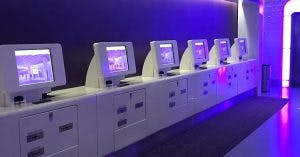
How High-Tech Solutions are Shaping Hospitality

Robots may be the solution for increasing housekeeping efficiencies, while creating better experiences for hotel patrons
If you walk into the Yotel New York in Manhattan, you may not notice right away that you have stepped into a hotel. You won’t see a bell hop waiting near the revolving door entrance, a line at a concierge desk, or fancy couches or lounge chairs—at least on the first floor.
What you will see: A row of sleek computers that guests can use to check themselves into their rooms and a robot that resembles a crane truck sitting behind a glass wall. The robot is there to collect suitcases from a compartment in the wall where guests can place their bags if they need to store luggage before checking in or after checking out of the hotel. After a guest places a piece of luggage on the rack in the compartment and enters some registration info into a computer, the robot—named Yobot—picks up the bag and places it into a secure locker. Sometimes staff are available to help visitors drop off their bags or retrieve them from the Yobot, but for the most part, the robot is a self-sufficient electronic concierge. In fact, it handles 30,000 pieces of luggage per year.
Why Hospitality Robots (or Yobots)?
Sahrette Saayman, director of communications at Yotel, said the hotel does not implement technology just for technology-sake. “All our robots deliver tasks that free up our crew to get on with other things, such as spending more time with other guests,” she said. “At our hotels, robots are mainly used for cabin deliveries and luggage storage—normally mundane and time consuming, but important tasks.”
These time-saving errands are beneficial to housekeeping staff who may be in charge of cleaning a considerable number of rooms in a short period of time. Not only do the robots take care of room deliveries for hotel guests, but they are also capable of delivering linens or other items housekeeping staff might need to complete their cleaning responsibilities. This helps to promote workloading efficiencies and also ensures housekeepers stay on task, according to Lauren Schechtman, Savioke’s vice president of marketing and sales. “When a housekeeper runs out of a cleaning product or needs replenishment of soaps, shampoo, or other amenity, they can have those items delivered to them rather than having to interrupt their workflow to make a special trip,” she said.
Hospitality is Paving the Way
Built environment expert Joseph Aamidor expects to see a rise in predictive personalization in the hospitality sector as robots and other forms of technology—such as sensors—become more prominent in the space. “Can we as the hotel, instead of letting you pick your temperature and lighting, predict what you prefer and deliver that experience?” he said. “It also could be used to change the hotel mood and environment without actually changing the physical aspects.”
Regardless of what the future holds for technology in the hospitality sector, the benefits are clear: “Technology helps to facilitate workers’ duties,” Saayman says. “Through technology, we can make hotels better places to work, improve staff recognition, and attract better employees. This drives all the way down to the guest experience, and in some circumstances, might create real operating expenditure savings as well as enhance productivity.”
Read more here.